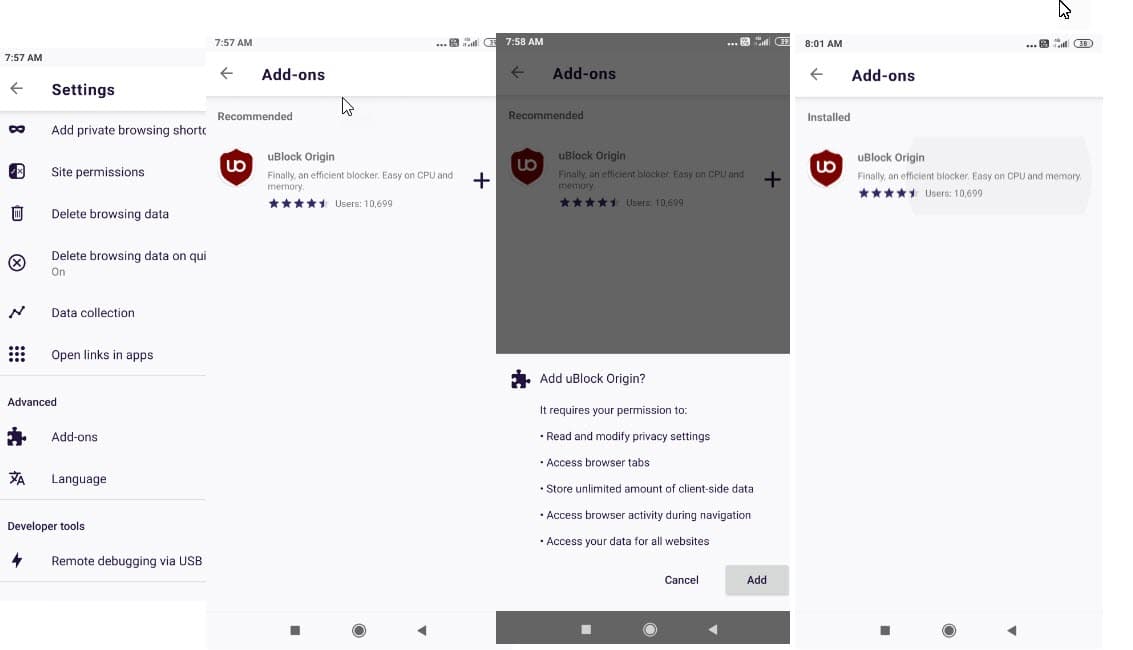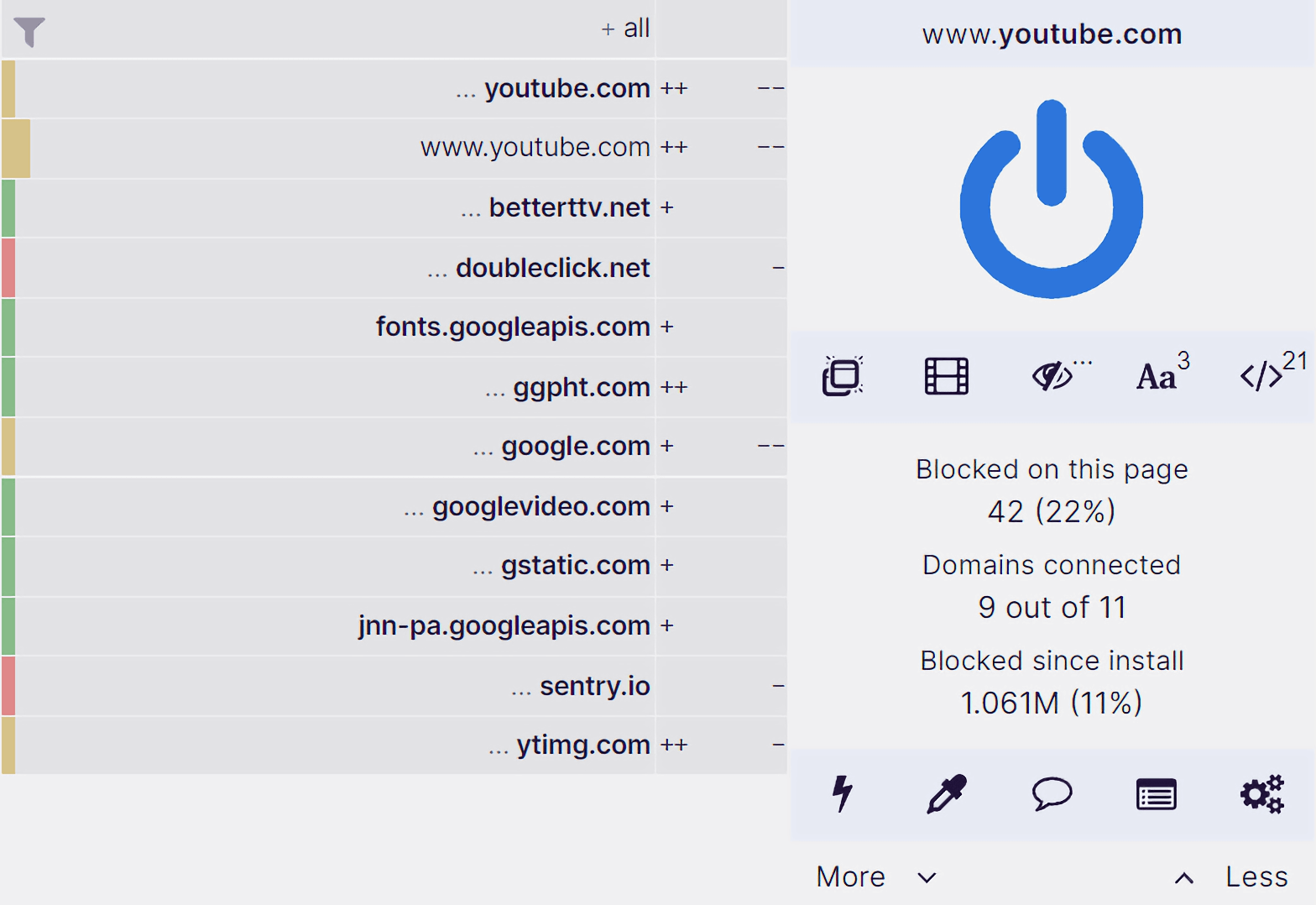Mozilla Ublock
Ad Blockers are a specific kind of software called an extension, a small piece of software that adds new features or functionality to Firefox. Using Ad Blockers, you can eliminate distraction and frustration associated with online ads popping up in your browser when you’re on the internet.
Extensions can do all kinds of fun and practical things like enabling new features, foreign language dictionaries, or visual appearances and themes. Using different extensions, you can customize Firefox to meet your needs and personal tastes!
The uBlock Origin is a free and open-source, cross-platform browser extension for content filtering—primarily aimed at neutralizing privacy invasion in an efficient, user-friendly method. CPU and memory efficiency Globally, uBlock Origin could save consumers more than $1.8 billion/year(study). UBlock origin is one of the many extensions that you can install to add extra features to Firefox. You can uninstall extensions via the about:addons page. '3-bar' menu button or Tools - Add-ons - Extensions.
But First, A Word of Caution
Many of the most trustworthy add-ons for Firefox come through our website, addons.mozilla.org (AMO), where we have collections of browser extensions subject to approval by Mozilla’s development team and to user feedback and review, as well. We catalogue and organize them for you, so you can find the best resources for your browser and minimize the risk of performance issues.
You can get add-ons from third party sites, but be careful installing any extension, especially ones that are unvetted, free and publicly available, as they could harm your computer.
Ublock Origin Edge
Ad Blockers Help You Take Control

Our Firefox Ad Blocker Collection contains five top extensions for you to install and use.
AdBlocker Ultimate
AdBlocker Ultimate is an ad blocker and removes ALL ads. There are no “acceptable” ads or whitelisted advertisers. It provides block tracking and helps you block malware.
uBlock Origin
An efficient blocker that’s easy on CPU and memory, too.

AdNauseum
Popup Block
Popup Block blocks all popup requests from any website by default. Canon pixma setup for mac. A notification window is opened to allow you accept, reject, open the popup in background page, or redirect the current page to popup address.
Webmail Ad Blocker
Expand your email area by blocking and removing ads on the right hand side of the screen when using Gmail, Hotmail, Outlook.com and Yahoo Mail with Webmail Ad Blocker.
Download the latest Firefox, and install our latest from our Ad Blockers Collection. And if you’re really into add-ons, follow our Mozilla Add-ons Blog and consider building your own extension to add to the collection!
Today, with the launch of Firefox 87, we are excited to introduce SmartBlock, a new intelligent tracker blocking mechanism for Firefox Private Browsing and Strict Mode. SmartBlock ensures that strong privacy protections in Firefox are accompanied by a great web browsing experience.

Privacy is hard

Mozilla Ublock Origin
At Mozilla, we believe that privacy is a fundamental right and that everyone deserves to have their privacy protected while they browse the web. Since 2015, as part of the effort to provide a strong privacy option, Firefox has included the built-in Content Blocking feature that operates in Private Browsing windows and Strict Tracking Protection Mode. This feature automatically blocks third-party scripts, images, and other content from being loaded from cross-site tracking companies reported by Disconnect. By blocking these tracking components, Firefox Private Browsing windows prevent them from watching you as you browse.
In building these extra-strong privacy protections in Private Browsing windows and Strict Mode, we have been confronted with a fundamental problem: introducing a policy that outright blocks trackers on the web inevitably risks blocking components that are essential for some websites to function properly. This can result in images not appearing, features not working, poor performance, or even the entire page not loading at all.
New Feature: SmartBlock
To reduce this breakage, Firefox 87 is now introducing a new privacy feature we are calling SmartBlock. SmartBlock intelligently fixes up web pages that are broken by our tracking protections, without compromising user privacy.
SmartBlock does this by providing local stand-ins for blocked third-party tracking scripts. These stand-in scripts behave just enough like the original ones to make sure that the website works properly. They allow broken sites relying on the original scripts to load with their functionality intact.
The SmartBlock stand-ins are bundled with Firefox: no actual third-party content from the trackers are loaded at all, so there is no chance for them to track you this way. And, of course, the stand-ins themselves do not contain any code that would support tracking functionality.
In Firefox 87, SmartBlock will silently stand in for a number of common scripts classified as trackers on the Disconnect Tracking Protection List. Here’s an example of a performance improvement:
An example of SmartBlock in action. Previously (left), the website tiny.cloud had poor loading performance in Private Browsing windows in Firefox because of an incompatibility with strong Tracking Protection. With SmartBlock (right), the website loads properly again, while you are still fully protected from trackers found on the page.
We believe the SmartBlock approach provides the best of both worlds: strong protection of your privacy with a great browsing experience as well.
These new protections in Firefox 87 are just the start! Stay tuned for more SmartBlock innovations in upcoming versions of Firefox.
The team
This work was carried out in a collaboration between the Firefox webcompat and anti-tracking teams, including Thomas Wisniewski, Paul Zühlcke and Dimi Lee with support from many Mozillians including Johann Hofmann, Rob Wu, Wennie Leung, Mikal Lewis, Tim Huang, Ethan Tseng, Selena Deckelmann, Prangya Basu, Arturo Marmol, Tanvi Vyas, Karl Dubost, Oana Arbuzov, Sergiu Logigan, Cipriani Ciocan, Mike Taylor, Arthur Edelstein, and Steven Englehardt.
We also want to acknowledge the NoScript and uBlock Origin teams for helping to pioneer this approach.
